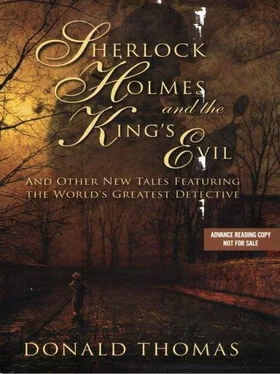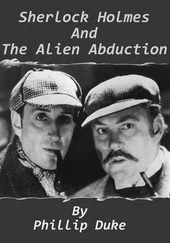From his bag, he also retrieved a metal right-angle set-square. I cannot count the number of times I had witnessed the scene which followed, usually at the work-table in Baker Street. Holmes, tall and gaunt, sat with his long back curved, gazing into the mysterious world of the powerful microscopic lens. One by one, he took the papers he had selected, all of them adorned by the strong neat lines of Robert Browning’s script. After scrutiny, he set each page down carefully with its lower left-hand corner in the angle of his set-square. At first he frowned and then his face cleared. When he had examined the last of them, he straightened up and turned in his chair.
“I believe we have the rascal, Watson! Empty every cupboard. Collect every book from every shelf. I believe they will tell us whatever else we need to know.”
I began to remove books by the armful and stacked them on the bare table. As I did so. Holmes took them one by one, trying each of his chosen documents against the blank fly-leaves of the volumes. Or rather, he tried them in many cases where the fly-leaf would have been-had it not been cut out! Someone had used the blank leaves as writing-paper-but might not that have been Robert Browning? Presently, Holmes put the manuscripts aside and subjected the books themselves to the lens. Each was opened and exposed to its powerful scrutiny.
He did not choose a particular page but opened each volume at random. I noticed the earliest printing of Lord Tennyson’s Morte d’Arthur in an edition of 1842, Mrs Browning’s Sonnets of 1847 and her Runaway Slave of 1849, Robert Browning’s Cleon and The Statue and the Bust both published in 1855, as well as Sir Galahad by William Morris and Dante Gabriel Rossetti’s Sister Helen, both having been issued in 1857. He looked closely at the first few but dismissed the rest with hardly a glance.
It was while Holmes was still examining this collection of rare editions, with the exclamations of a man who has been proved right after all, that Pen Browning arrived alone. He looked with some surprise at the tubular steel of Monsieur Nachet’s compound microscope. Holmes swung round but without getting up.
“Mr Browning! Pray be seated!” He indicated one of the straw-bottomed chairs. “First I will tell you what you already know. You and your parents’ reputations have been in great danger, since their secrets and confidences have somehow been distributed to the auction houses of the world. I believe we may now say that the danger of blackmail or embarrassment is past.”
For the first time in our acquaintance, the young man smiled.
“I am truly your debtor, Mr Holmes, if that is so.”
“I have no doubt that it is. First, however, you must indulge me by answering a few questions.”
“I will gladly do that.”
“Very good. You remember nothing of your mother’s “Reading Sonnets” of 1847 because the edition would have been issued long before you were born.”
“I know that my father had doubts about publishing the poems at all, even after they had been given to the world in 1850. He said to me several times that people should not wear their hearts upon their sleeves for daws to peck at. He said it again when it was suggested that his letters to my mother during their courtship-and hers to him-should be published after his death.”
“Very interesting. Now I must ask you one question that is most important. I beg that you will consider carefully before you answer.”
“Indeed I will.”
“When your father made a fair copy of a poem, and while the ink was still wet, did he use a sand-box to dry the ink in the old fashioned method? Or did he use blotting-paper as many people have done for the past thirty or forty years?”
Pen Browning looked surprised but the answer came readily enough.
“Neither. My grandfather had held a post in the Bank of England and had used a brass sand-box, shaking fine sand on to the ink and then shaking it off again. In Florence, we still had the brass box. I played with it as a child. It was never used otherwise.”
“And blotting-paper?”
“When I was a little boy I sat with my father while he made fair copies of his poems. He never used blotting-paper, for fear that it would cause a smudge and that he must begin again. I do not recall that he ever possessed any. Indeed, he said that a poet must be like a medieval scribe and set out his pages in the sun to dry. That was easily done in Italy.”
Holmes handed him the manuscript of Savonarola.
“Would you look at that, please. It is dated 1855. Is it your father’s?”
“It appears like his writing. I do not know the poem. It may well be his.”
“Would you look at the last lines and tell me what you see?”
“Nothing. Unless that they are dimmer than the rest. He would not have allowed that in a fair copy.”
“Would he not?”
“The appearance of a poem was a work of art to him, like a painting. He was very particular about the look of it.”
“But the person who wrote this was not particular, was he? Moreover your father did not use blotting-paper, as you say. This page was written out complete and then blotted. The upper lines of ink had dried and darkened progressively by then. The later lines were still wet and the ink was drawn away, leaving them dimmer.”
“Is that all?”
“No, Mr Browning, it is not nearly all. Under microscopic examination, it is possible to see that the fainter letters are also feathered in their outline from the pressure of being blotted. There is even a microscopic wisp of what appears to be white blotting paper.”
Pen Browning’s face clouded with unease.
“I have told you what I remember, Mr Holmes, but no one can swear that my father may not have used blotting-paper on one particular occasion. Perhaps this was not a fair copy.”
“Perhaps it was not, Mr Browning, but it was blotted and dated 1855. Curious, is it not, that blotting-paper was not manufactured commercially until 1857 and only then in the United States? Moreover, until 1860 it was made of pink rag and only after that from white.”
“And is that all?”
“It is not,” said Holmes a little impatiently, “The pages of the poem, like most of the manuscript copies on this table, are not quite square. Take my set-square and try to make a right angle at the bottom left corner. You will see that there is a slant to many of them, rather than a straight line, and that many others are a little too narrow for octavo. It is often difficult to cut straight at the beginning when one cuts a blank fly-leaf from a book.”
Pen Browning’s mild face looked up uncomprehendingly.
“I do not understand, Mr Holmes.”
“I daresay not. These pages are the fly-leaves which have been cut from books on this table, perhaps six months ago. During the time you have been on your way I have matched most of them with the stubs left in the books from which they were cut. Our forger had imagined he would return here with ample time to cover his traces. Mortality has caught him out.”
“Why would my father, or anyone else, want to write a poem in 1855 on a fly-leaf cut from…”
“Cut from his poem Cleon printed in that year?”
“Yes.”
“He did not do so. The book itself is a forgery. Like the rest of these volumes and the inscriptions within them.”
I interrupted at this point.
“I think you had better explain that, Holmes. How can a book be a forgery? Cleon is one of Robert Browning’s outstanding poems and it is included in Men and Women.”
“More precisely then,” said Sherlock Holmes, “Whatever it may claim on its title-page, this copy of Cleon was not printed in 1855, nor in 1865 nor in 1875-nor probably even in 1885. It would have been a physical impossibility. Would you care to make use of the microscope?”
Читать дальше












